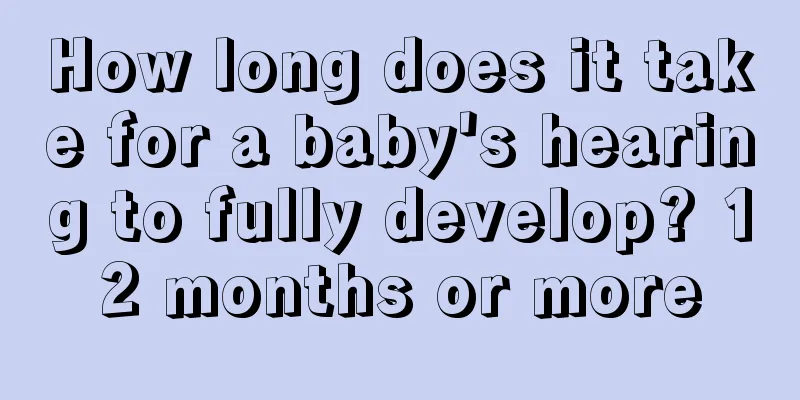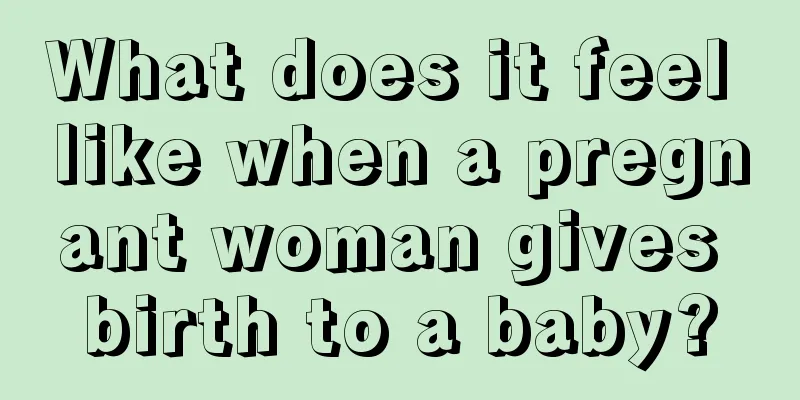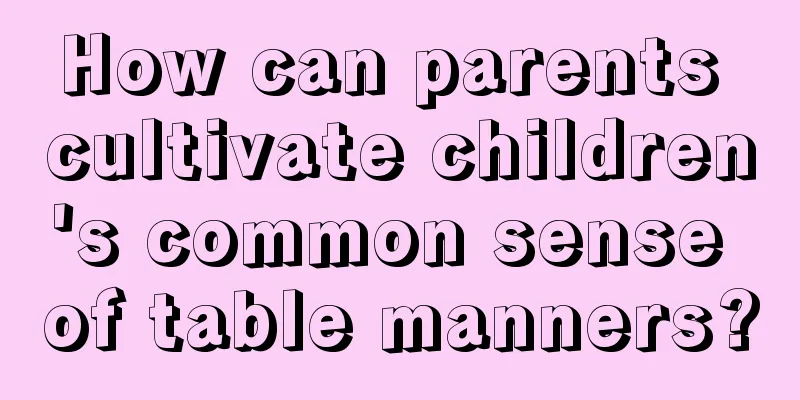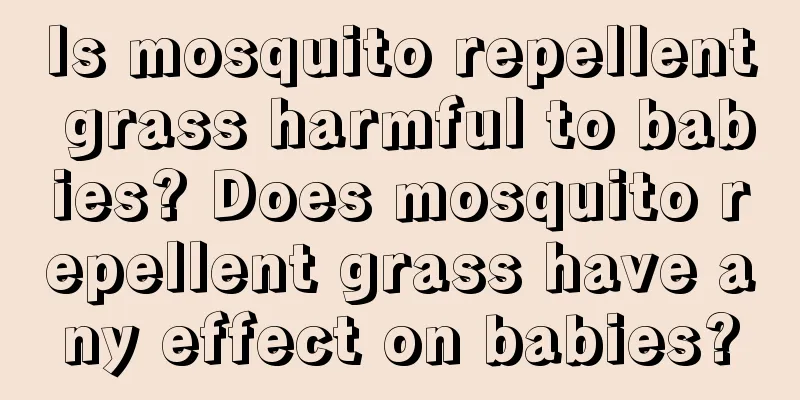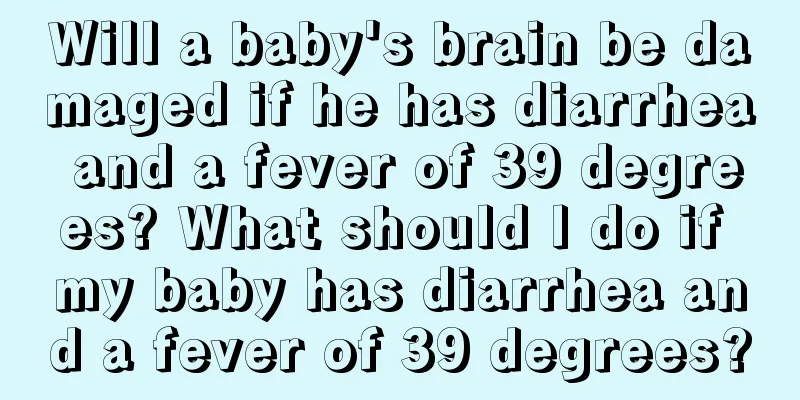What are the symptoms of a baby swallowing a foreign object? What should I do if my baby swallows a foreign object?
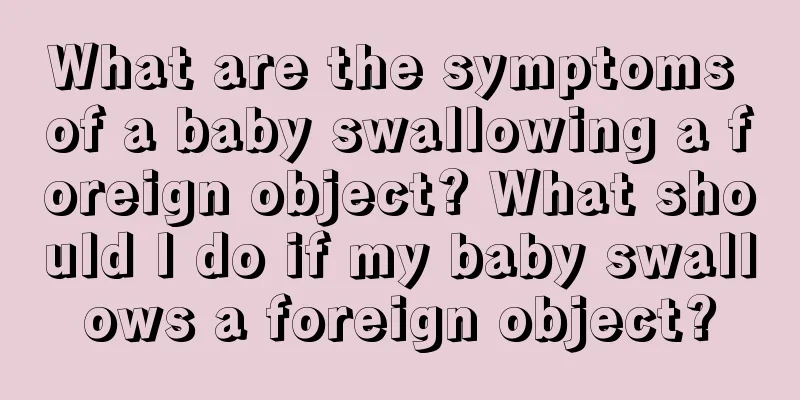
|
Babies are very young and often swallow some food by mistake. As adults, we not only need to pay more attention to them, but also need to learn more about these knowledge and solutions to avoid accidents. What are the symptoms if a baby swallows a foreign object?It is common for babies to swallow foreign objects by mistake, especially babies under 3 years old, who are curious and have relatively complete swallowing ability. If there are small objects scattered around the baby, they may be put into the mouth and swallowed by mistake, such as buttons, coins, pins, game coins, rhinestones, screws, pills, small toy parts, etc. When a baby swallows a foreign object by mistake, the baby will experience discomfort. Parents should find out and deal with it in time. The symptoms are as follows: 1. When foreign matter is stuck in the cervical esophagus Symptoms include crying, restlessness, increased saliva, difficulty swallowing, choking, refusal to eat, or vomiting after eating. If foreign objects press on the nearby throat or trachea, reflex laryngeal spasm, coughing, wheezing, difficulty breathing, and even suffocation may occur. Sometimes due to pain, children maintain a posture with their necks extended forward and dare not move. 2. When foreign bodies are stuck in the thoracic esophagus The child will mainly experience pain behind the sternum, but the obstruction and respiratory symptoms will be relatively mild. 3. When sharp foreign objects damage the esophagus Complications such as esophagitis, esophageal abscess, esophageal perforation, mediastinal infection, esophageal organ fistula, suppurative pleurisy, etc. may occur. Fever, dehydration, dyspnea and systemic poisoning symptoms may occur. Moreover, sometimes sharp foreign bodies (small bone fragments or fish bone spurs) can directly penetrate the esophageal wall, the aorta or pericardium, causing massive gastrointestinal bleeding or pericardial suppuration, which is extremely dangerous. 4. When the foreign body successfully reaches the gastrointestinal tract Most foreign bodies remain in the gastrointestinal tract for a long time without causing any symptoms, occasionally causing abdominal discomfort or crampy abdominal pain. 5. When sharp foreign objects damage the gastrointestinal mucosa Sharp foreign objects can damage the gastrointestinal mucosa and cause intestinal bleeding, but gastrointestinal perforation rarely occurs. If the perforation symptoms appear slowly, there are no symptoms and signs of acute peritonitis. 6. When there are hair balls or plant balls in the stomach There are usually no obvious symptoms of hair balls or plant balls in the stomach, but they may sometimes be accompanied by pain, nausea, vomiting, loss of appetite, etc. In summary: If a foreign object is stuck in the esophagus, the baby will drool constantly, be unable to swallow other things, cough, and have rapid breathing. If the respiratory tract is blocked, the baby will cry and his face will turn black. If the swallowed foreign object is sharp, the baby's mouth may bleed or be injured. If there is no obvious abnormality for the time being, the baby who has swallowed a foreign object has his upper respiratory tract locked, and there will usually be a whooshing sound when breathing, and generally there will be nausea, bloating and abdominal pain. Therefore, if you find that your baby has a long-term cough or has an asthma-like condition for unknown reasons, you can take your baby to the hospital for examination. What to do if your baby swallows a foreign objectWhen you need medical attention If the baby swallows a foreign object, immediately check what the baby has eaten. If choking occurs, help the baby spit it out immediately. If the food cannot be spit out and blocks the trachea, causing choking or severe coughing, you need to send the baby to the hospital immediately. Go to the hospital for emergency treatment. If you swallow something sharp, such as a thumbtack or pin, you should also seek emergency treatment immediately. If you drink liquids containing strong acids or bases, you should also go to the hospital immediately. What should I do if I accidentally swallow a foreign object? 1. Swallowing buttons If it is a plastic button, it is difficult to detect it with an X-ray. If the button reaches the stomach and intestines, it can be excreted in the stool. Parents should pay attention to this. If the button enters the trachea, it will cause breathing difficulties, so take the child to see a doctor immediately. 2. Swallowing a hairpin Although the hairpin is long, if it passes smoothly through the intestines of a child, it will be excreted in the stool within a week. If the hairpin is swallowed and gets caught somewhere in the internal organs, the child needs to be taken to the hospital for an X-ray to find out where the hairpin is. 3. Swallow peanuts Peanuts are the most dangerous of all objects because their location cannot be detected by X-ray. If they get stuck in the trachea or bronchi, they will swell after absorbing water, blocking the airway and causing suffocation. Therefore, do not feed them to children casually. 4. Inadvertent medication You already know the amount and time of the accidental ingestion of the medicine. If the effects of the medicine are not too serious, you can give your child some milk or reduce the amount of the medicine in the stomach. 5. Swallowing poison If the poison is accidentally ingested, it is not a big problem if the child can vomit it. However, some poisons containing strong acids and strong alkalis cannot be vomited, because vomiting may cause rotting of the throat and esophagus. Places in the body where foreign objects are most likely to get stuck: 1. Trachea and larynx When the trachea is blocked, young children are prone to wheezing. In severe cases, aspiration pneumonia may occur and they should be sought medical attention immediately. 2. Esophagus (the narrow part of the upper esophagus or the cardia where the lower esophagus enters the stomach) When a foreign body is stuck in the esophagus, first aid should be used to help the child cough it out. If it persists in the esophagus or is a toxic substance such as a disc battery, the foreign body should be removed with an endoscope as soon as possible. 3. Stomach and duodenum (especially the pylorus from the stomach outlet to the duodenum) If the foreign body is relatively harmless, such as coins or buttons, and is already in the stomach, it can be observed for up to 4 weeks. If it is stuck in the duodenum, it is generally recommended to observe for up to 2 weeks to see if the foreign body will be expelled on its own. If there is still no movement, it can be removed by endoscopy. 4. Where the small intestine enters the large intestine If the foreign body is stuck in the small intestine, it must be removed surgically. If it has entered the large intestine and the foreign body is analyzed to be non-hazardous, it can be excreted with the feces. 5. Rectum and anus Foreign objects can be removed by digging. The main measures to prevent children from having airway foreign bodies are: ① Do not feed peanuts, melon seeds, beans and foods with pits (such as dates, plums, oranges, etc.) to preschool children; ② Correct the bad habit of children putting small toys in their mouths to play with them in time, and try to avoid giving children small toys that may be inhaled into the airway; ③ Cultivate good habits of eating quietly in children. Children should be strictly prohibited from making noises, running and jumping while eating. Adults should also be careful not to scold or scare children, or make them laugh. Emergency treatment 1. If a foreign object gets stuck in your throat and you are choking, take emergency self-help measures immediately: A. Lift the baby upside down and pat the baby's back on both shoulder blades. B. Hold the baby's waist from behind with both hands, make a fist with one hand and press the thumb on the xiphoid process in the upper abdomen, and use the palm of the other hand to squeeze quickly and forcefully, and repeat the above actions. C. Lower the baby's head, make a fist with one hand, and put the thumb on the xiphoid process of the upper abdomen, that is, above the navel. Make a fist with the other hand and squeeze backward and upward violently. The movement should be fast, and then relax. You can squeeze quickly 3-5 times. You can also squeeze the upper abdomen with the help of the back of a chair or the edge of a table, and then relax. 2. If you keep coughing but can barely breathe, go to the hospital for emergency treatment immediately. 3. If the baby swallows buttons, batteries or other sharp objects, do not let the baby vomit, and take the baby to the hospital immediately. 4. If hair dye, perfume, cigarettes, etc. are swallowed, let the baby drink breast milk or milk powder immediately to dilute it and then spit it out. 5. If the child swallows adult medicine or water from an ashtray, immediately make him vomit and send him to the hospital. 6. If someone has ingested strong acidic or alkaline substances such as detergents, bleach, gasoline, etc., do not drink anything and do not let him vomit it out. Instead, go to the hospital immediately. Post-mortem observation 1. If the baby accidentally swallows something like small beads, observe the baby. If there is nothing abnormal at the time, pay attention to the baby's stool within the next three days to check whether the beads have been excreted. 2. If the stool is not discharged, but the baby is still in a good mood and has a normal appetite, it is not a big deal. If you are worried, you can consult a doctor. 3. If you accidentally swallow a small amount of soap, toothpaste, desiccant, mosquito coils, insect repellent, etc., pay attention to the situation at home. If there is no abnormality, there is no need to worry. 4. If your baby becomes emotionally unstable, has a poor appetite, and cries for no reason over the next few days, it is best to seek medical attention immediately. 5. For babies who are prone to constipation, they can eat foods rich in crude fiber to expel foreign objects as soon as possible. How to deal with baby swallowing foreign objectsCase 1: Swallowed foreign body stuck in trachea Symptoms: After accidental swallowing, the baby's face will turn blue, the baby will hold his breath, have difficulty breathing, or have severe coughing and wheezing, which may indicate that the object has entered the trachea. First aid measures: Use the Heimlich maneuver. Suitable for babies under 3 years old: (1) The parent should immediately pick up the baby, pinch both sides of the baby's cheekbones with one hand, place the arm on the baby's chest, and support the back of the baby's neck with the other hand. The parent should let the baby lie face down on the parent's thigh with the head slightly lower than the torso, and pat the baby's back between the shoulder blades 1-5 times. (2) Let the baby lie on his back with his back against the parent's thighs. Place the middle and index fingers on the baby's abdomen below the rib cage and above the navel, and press upward quickly 1 to 5 times. (3) Repeat back patting and abdominal compression until the foreign body is flushed out. For children aged 3 and above: The parent hugs the child from behind, makes a fist with one hand, presses against the baby's upper abdomen, and places the palm of the other hand on the fist. Both arms press upward and inward with force, tightening and loosening rhythmically until the foreign object is flushed out. Case 2: Swallowing a sharp foreign object Symptoms: After being swallowed accidentally, if the sharp foreign object damages the esophagus, fever, dehydration, difficulty breathing and systemic poisoning symptoms will occur. First aid measures: Sharp foreign objects, such as date pits, suture needles, etc., can easily cause esophageal and gastrointestinal perforation. You should go to a large hospital as soon as possible and use a pediatric gastroscope to remove them. Case 3: Swallowing a small, non-sharp object Symptoms: If the object is not sharp and the baby does not change color, breathes steadily and does not cough, it means the object has not entered the trachea but the esophagus. The most common symptoms are dysphagia, foreign body sensation, pain, and increased saliva. First aid measures: Parents should try to keep the baby quiet and avoid eating to prevent the foreign body from being pushed deeper and aggravating the injury. Small foreign bodies that are not sharp can usually be excreted with the stool after 2-3 days. During this period, the baby can eat more vegetables rich in crude fiber, such as celery, sweet potatoes, etc., but do not induce diarrhea. Case 4: Inadvertent swallowing of medication (1) Accidental ingestion of general medicines with low dosage For vitamins and Chinese patent medicines, let your baby drink more water to dilute the medicine and excrete it through urine as soon as possible. (2) Accidental ingestion of toxic or side-effect drugs Parents must quickly induce vomiting, and then give the baby a large amount of tea and soapy water to repeatedly vomit and wash the stomach. Then let the baby drink a few glasses of milk to nourish the stomach and detoxify. (3) Accidental ingestion of highly corrosive drugs Do not induce vomiting. It is recommended to take an appropriate amount of milk and egg white and go to the hospital for treatment immediately. Egg white and milk can cover the gastric mucosa, reduce the contact area between the strong acid corrosive substances and the gastrointestinal mucosa, and play a role of dilution and isolation. (4) Ingestion of iodine Immediately drink starch-containing liquids such as rice soup and noodle soup, then induce vomiting, and repeat until the vomitus is no longer iodine-colored. What to do if your child swallows a foreign objectIf a child swallows a foreign object, parents should not dig it out with their hands to induce vomiting, or feed the child water or food to try to make the child swallow the foreign object, so as to avoid causing greater harm and increase the difficulty of subsequent treatment. Taking laxatives is also not advisable. It is best to take the child to the doctor in time and let the doctor remove the foreign object with professional instruments. After swallowing food, the sooner the foreign object is removed, the better. For example, if a button battery is swallowed, it has a strong corrosive effect on the gastrointestinal tract and can cause serious complications, including esophageal burns. 1. Children aged 2-3 are prone to swallowing foreign objects Children aged 2 months to 1 year old like to eat anything. At this time, they mainly use their mouths to explore the world. As the ability of children's hands and feet develop rapidly, they can grasp and reach more and more things when they are 2-3 years old. Children at this stage are also the group most likely to swallow foreign objects by mistake. Among them, coins are the most likely to be swallowed by children, especially in cities where coins are frequently used. Children are most likely to swallow one-yuan coins or five-cent coins by mistake. Because coins need to be used frequently, adults generally choose to store coins in places that are easier to see, and these places are often places where children can easily reach. As long as children get them, there is a possibility of swallowing them. Therefore, parents must not store small objects in places where children can easily reach. When accompanying children, adults should not be distracted and should pay more attention to their children's actions. When the elderly and children eat harder food, they must break it up, and adults should remove the core of the food before giving it to children. 2. First aid for children who accidentally swallow foreign objects It is very dangerous for a child to have a foreign object stuck in his or her respiratory tract, which can cause breathing difficulties and cardiac arrest within a short period of time. While seeking medical help, the child also needs first aid. First aid for children under 1 year old: 1. Pick up the baby immediately, pinch both sides of the cheekbones with one hand, and keep your arm against the baby's chest; 2. Use your other hand to hold the back of the child's neck and let him/her lie face down on the rescuer's knees; 3. Pat the baby on the back 1-5 times and observe whether the baby spits out the foreign object. The rescuer stands behind the child, places both hands between the child's navel and sternum, makes a fist with one hand, covers the fist with the other hand, tightens both arms, and presses the child's chest instantly. Continue to squeeze and press several times until the tracheal obstruction is relieved. |
<<: What are the precautions after IVF transplantation?
>>: How old is the baby able to speak? How to train the baby to speak?
Recommend
Does Kao toothpaste have a seal? Does Kao toothpaste have a packaging box?
Different toothpastes have different seals, some ...
Will calcium deficiency affect children's sleep? Will calcium deficiency affect children's growth?
Usually, children's growth and development ca...
What is the reason for a newborn baby to have diarrhea after drinking breast milk? What should I do if a newborn baby has diarrhea after drinking breast milk?
What is the reason for newborns to have diarrhea ...
What causes fetal toxins? What is the best time to remove fetal toxins?
Fetal toxicity is a very common phenomenon, and t...
What are the methods for pregnant women to induce labor? Is it good to take an injection to induce labor?
When the mother reaches the due date, there is st...
What to eat during childbirth to help with childbirth? Eating chocolate during childbirth
Giving birth is not only a matter of exhausting t...
What to do if you have pain and bleeding during intercourse after a cesarean section? How to avoid pain and bleeding during intercourse
If you experience pain and bleeding during sex af...
How should I take care of myself when the due date is approaching? What are the key points of diet during the confinement period?
When the due date is getting closer, pregnant wom...
How to identify the authenticity of Calcium Trace? Can Calcium Trace be taken with milk?
Calcium Trace is an international calcium supplem...
What should I do if my milk is swollen during weaning? When is the best time to wean?
Weaning is a very tricky thing for both mothers a...
What can children eat to grow taller What can children eat to grow taller
Children's height growth is an issue that eve...
What to do with abdominal distension and pain in children? What fruits are good for children with abdominal distension?
The digestive system of infants is relatively fra...
What medicine should be taken for neonatal jaundice? How to detect neonatal jaundice?
Many newborn babies will suffer from jaundice, an...
How to guide a 1.5-year-old baby who loves to hit others
When a child suddenly hits someone, it often emba...
Can I turn on the air conditioner when my baby has a fever in summer? Can I turn on the air conditioner when my baby has a fever?
In summer, babies are prone to getting sick and h...

